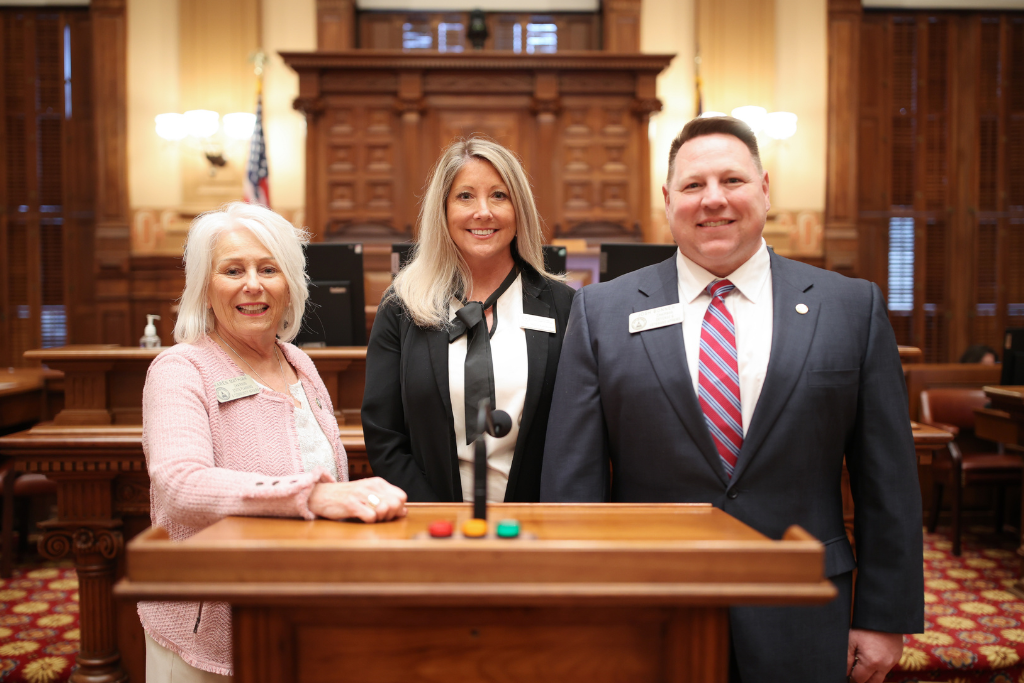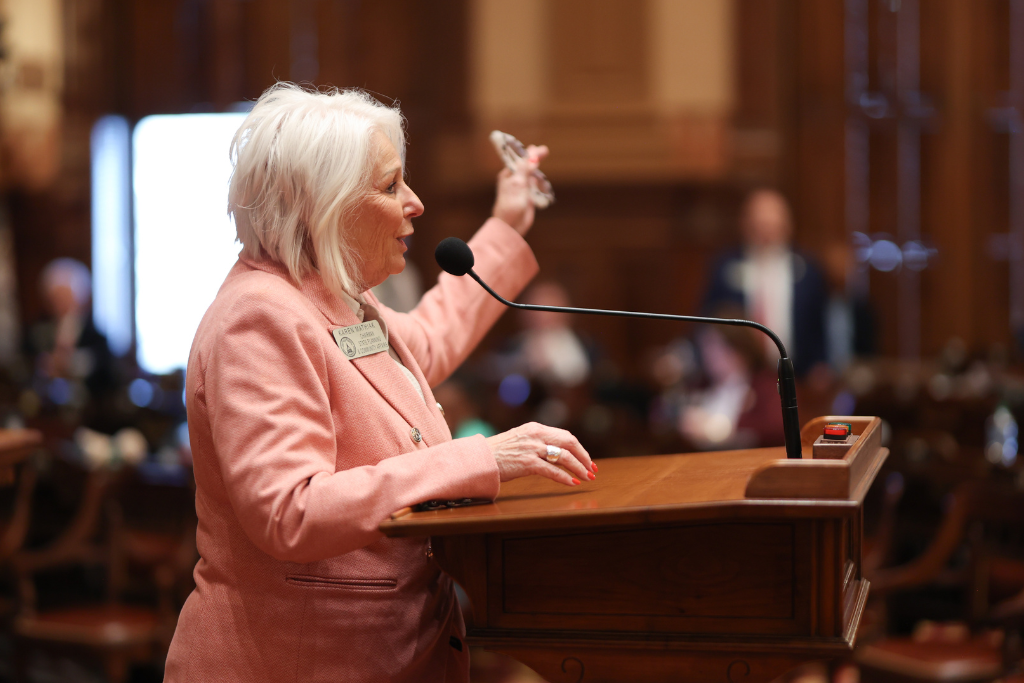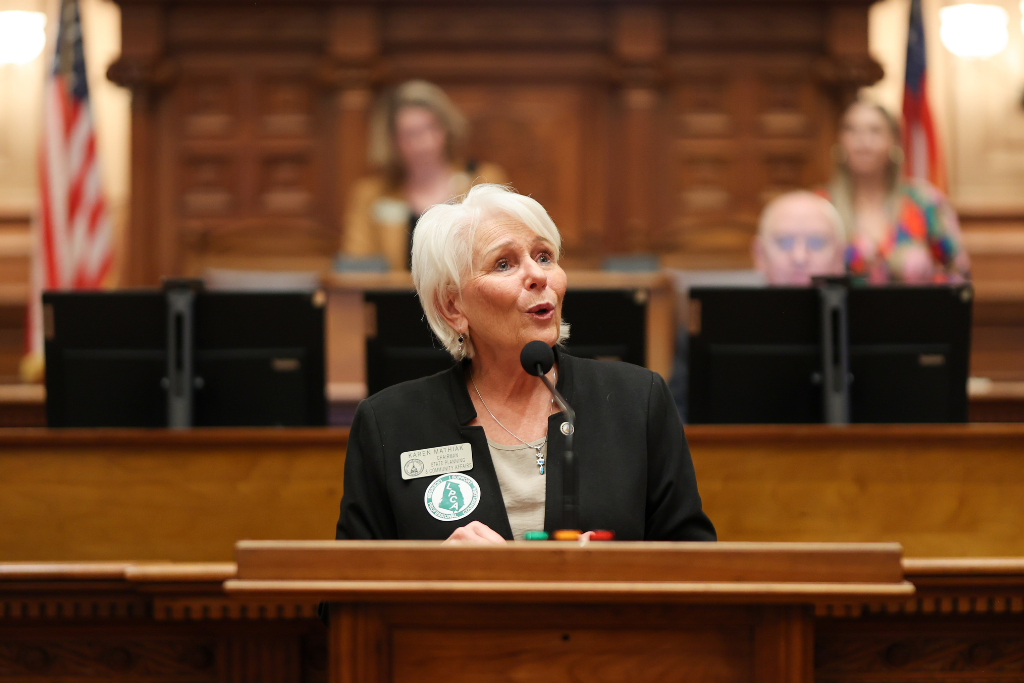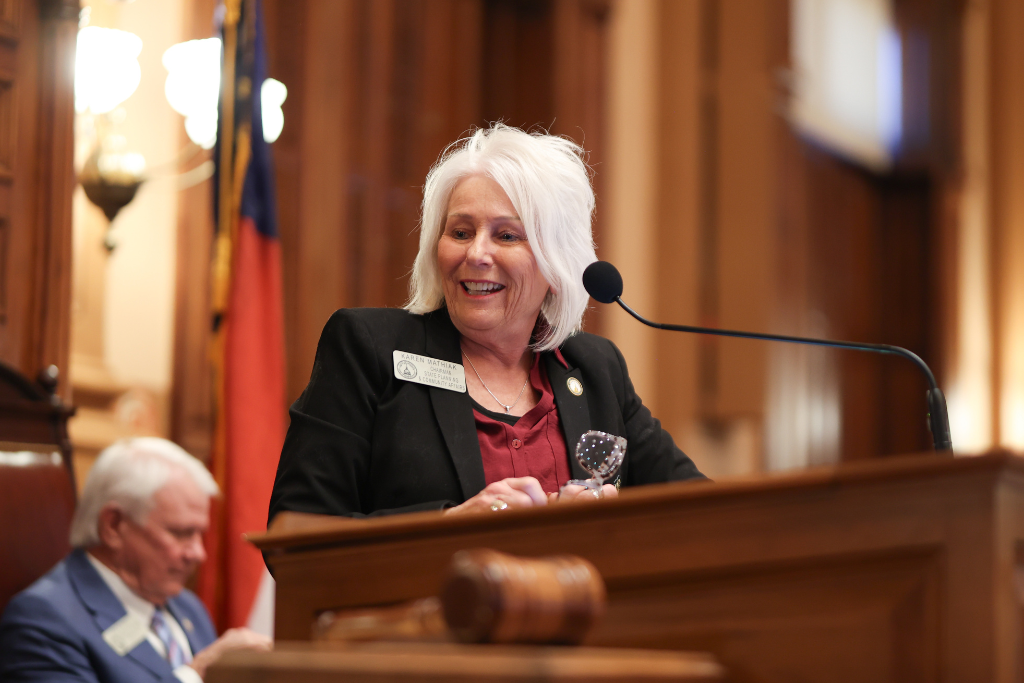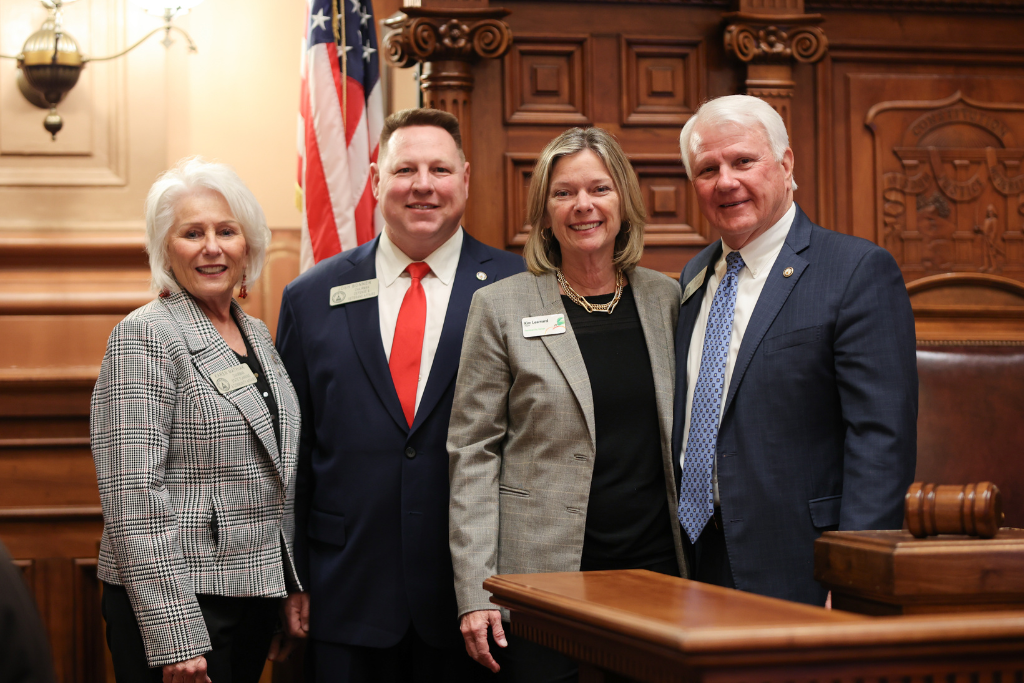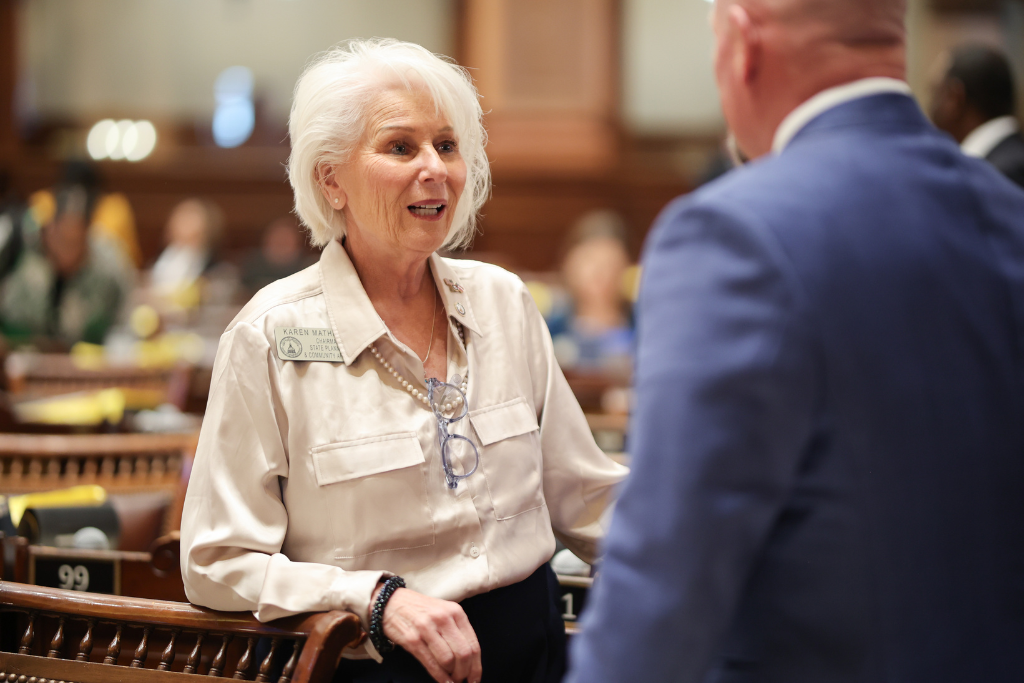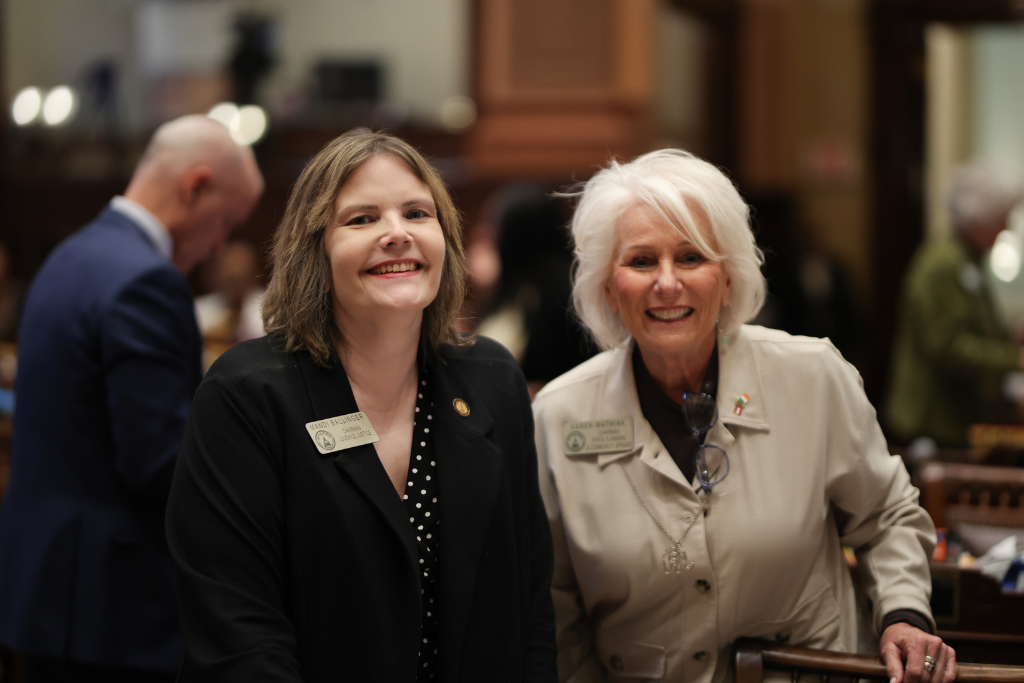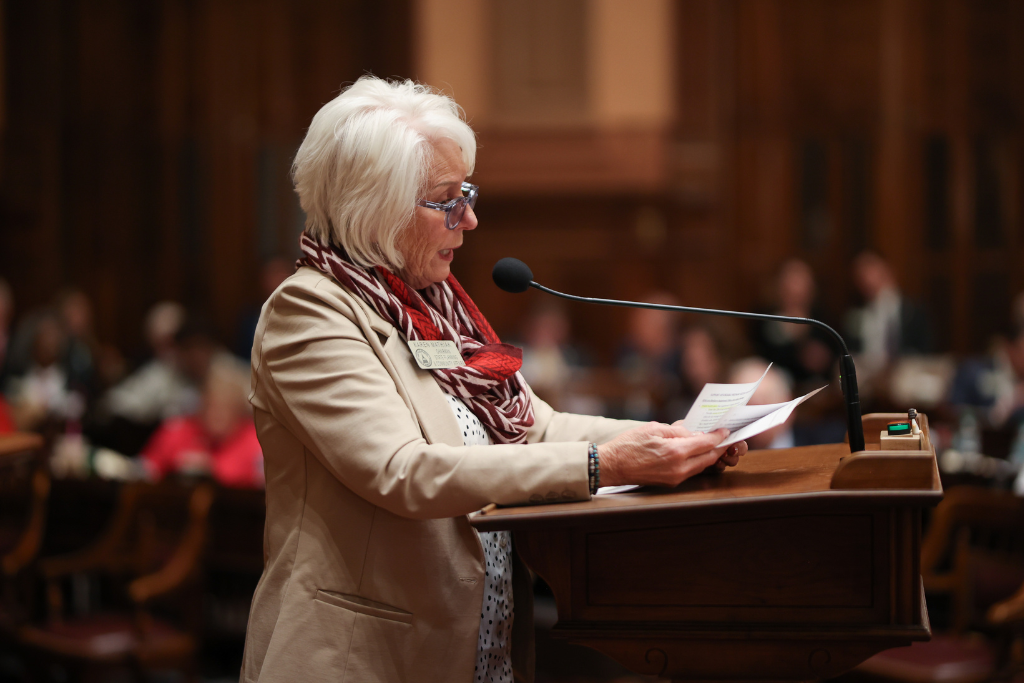Week 9 Legislative Session Recap 2024
March 4-8, 2024

Following an eventful eighth week of session, during which we passed 72 bills on “Crossover Day” alone, the House got back to work on Monday, March 4 for another productive week under the Gold Dome. In the ninth week, our attention shifted to reviewing and voting on Senate Bills following the “Crossover Day” deadline last week. We also continued making progress by passing the House’s version of the Fiscal Year 2025 budget to send to our counterparts in the Senate. As we move forward in the final days of session, our work is more crucial than ever as we perfect legislation and ensure that the legislation we send to the governor reflects the best interests of our citizens.
This week, the House passed its version of the Fiscal Year 2025 (FY 2025) budget, House Bill 916, fulfilling our one constitutional obligation for the session. The FY 2025 budget will go into effect on July 1 of this year and is set at a revenue estimate of $36.1 billion, representing a historic increase of $3.6 billion, or 11.3 percent, over the previous fiscal year’s budget. The passage of this budget marks a significant milestone in Georgia's commitment to addressing the diverse needs of its citizens and reflects a robust investment across various sectors for the state’s growth and prosperity.
The House’s FY 2025 budget exhibits a substantial investment in Georgia's education sector, prioritizing various initiatives that are crucial for the advancement of K-12 education. In particular, HB 916 fully funds the Quality Basic Education (QBE) program by allocating a record $14.1 billion in state funds. This budget also includes provisions to enhance teacher salaries, with $373.6 million to increase the state base salary schedule by $2,500. Additionally, funding is reserved for salary raises for school nutrition workers, bus drivers, school nurses and Regional Education Services Agencies (RESA) staff, as well as $8.5 million for a $1,000 salary supplement for school custodians. The school nutrition program receives an additional $6.3 million to cover the cost of breakfast and lunch for reduced-paying students, and $2 million is included in school nutrition formula funds for local school systems to keep the price of meals affordable, both of which were priorities of the House. The House’s version of the budget also seeks to improve literacy rates in our state with $6.3 million appropriated for reading instruction grants to fund literacy coaches at each RESA, as well as pay supplements for literacy support coordinators and leads at school districts across Georgia. The House also prioritizes school safety in our budget, recognizing it as a fundamental component of providing a conducive learning environment for students and fostering a sense of security in the classroom, with $104 million allotted for the new School Security Grants program under the Department of Education. This new program will provide a $45,000 grant to each school for school safety and security initiatives, and those funds could be used for infrastructure expenses, operating expenses or salaries for school resource officers. Another significant investment includes $204 million in additional funding for student transportation, which also includes additional funds for transportation operations to reflect the increased cost of fuel, oil and other operating expenses, bringing the total funding for student transportation to $358.5 million in FY 2025. This funding formula for student transportation has not been updated in more than a decade, so this increased funding was another House priority. Furthermore, Communities in Schools receives an additional $1.57 million to support students academically and non-academically, aiming to improve attendance, behavior and graduation rates. The House’s version of the budget also reserves $9.5 million in lottery funds for the reduction of Pre-Kindergarten class sizes from 22 to 20 students, demonstrating our commitment to early childhood education and development. These strategic investments underscore the House’s dedication to advancing educational opportunities and outcomes for all students in Georgia.
My legislative colleagues and I also took significant steps to bolster funding for Georgia's higher education system to advance educational excellence by addressing key priorities and initiatives aimed at enhancing educational opportunities, workforce development and preparing Georgia's students for success in higher education and beyond. The House’s version of the budget dedicates $1.5 million for the establishment of the David Ralston Center for Behavioral Health and Developmental Disabilities at the University of Georgia, a crucial step in addressing workforce needs and gaps in serving individuals with intellectual and developmental disabilities. By establishing this center in honor of the former Speaker of the House, the state will boost the pipeline of professionals working in behavioral health across our state and serving more citizens. HB 916 also incorporates an additional $15 million for the state’s Dual Enrollment program, reflecting its growth and importance in providing high school students with access to college-level coursework.
We also made important investments in our healthcare infrastructure to improve health outcomes and address public health needs throughout the state. As such, HB 916 directs $2 million toward rural hospital stabilization grants to support healthcare access in rural communities. The House also provides $500,000 for infant mortality research at Morehouse School of Medicine’s Center for Maternal Health Equity and $978,639 for expanded newborn screenings. In addition, this budget delivers funding for first responders diagnosed with post-traumatic stress disorder with $1 million for supplemental illness-specific insurance. Lastly, HB 916 includes increased funding for multiple providers serving Medicaid patients. This includes $7.5 million for speech therapists, audiologists, physical therapists and occupational therapists; $8.4 million for primary care physicians and obstetricians; $392,173 for optometrists;
$648,829 for independent pharmacists; and $1.3 million for physical therapy assistants and occupational assistants. Our budget also includes important funding for new services to be available to the state’s Medicaid population to include $9.6 million for dental services; $3.4 million for transportation reimbursement to emergency medical services; and $301,941 for acute kidney injuries to be treated in a dialysis setting.
To address housing challenges, Georgia's economic development sector also receives funding in the House’s budget. Within the Department of Community Affairs, the House’s version of the FY 2025 budget earmarks $1 million for the accountable housing initiative, aimed at providing stable and immediate housing solutions for homeless individuals while promoting long-term affordability. Additionally, the House supports the governor's recommendation to allocate $3.7 million to enhance homelessness services through new federal grant opportunities. Further, the House appropriates $6 million for the Rural Workforce Housing Initiative, which focuses on expanding and improving housing stock to meet the current workforce housing needs in rural areas of our state.
The House’s budget encompasses $3.2 million in funding for the Department of Behavioral Health and Developmental Disabilities to establish the Macon Crisis Stabilization Diagnostic Center, which will serve as a pivotal resource as the state's first crisis support center for adults with intellectual and developmental disabilities. Further, HB 916 designates $2.9 million to aid Georgians experiencing homelessness, providing essential support through housing voucher slots, behavioral health services and rapid rehousing initiatives. This budget also supports our veterans with funding directed for a coordinator to assist veterans experiencing homelessness and $1 million for the Georgia Veterans Service for behavioral health services for active-duty military members and veterans. Moreover, HB 916 demonstrates our commitment to safeguarding Georgia’s children by allocating $1 million to expand the capacity of court-appointed special advocates to support children who have experienced abuse, neglect, exploitation and trafficking and $1.5 million to enhance forensic and mental health services at the state's Child Advocacy Centers.
Public safety initiatives receive considerable funding within HB 916, specifically, toward empowering law enforcement and backing programs aimed at preventing crime and aiding victims. Notably, the bill designates $50 million for a $3,000 salary increase for law enforcement officers across 21 state agencies, showcasing our commitment to attracting and retaining top talent in law enforcement. The House’s FY 2025 budget also includes a $10 million allocation to the Georgia Department of Corrections for establishing 400 transitional center beds at the Metro Re-entry Center, providing crucial resources for inmates reintegrating into society post-release. Additionally, the House directs $14.7 million to the Criminal Justice Coordinating Council (CJCC) to support 48 domestic violence shelters, as well as $2 million for 28 sexual assault centers, covering administrative and facility costs to ensure compliance with state standards. Finally, HB 916 appropriates $4 million to the CJCC for hiring a dedicated sexual assault nurse examiner coordinator to reinforce the integrity of forensic medical examinations that are essential for prosecuting sexual assault cases.
Other noteworthy investments in the House’s FY 2025 budget include: $260 million to provide a four percent cost-of-living adjustment for state employees; $2.5 million for third-party ballot-text auditing technology to enhance election verification processes and promote transparency; $2.4 billion to support various projects and initiatives aimed at enhancing the state's transportation system to improve mobility, alleviate congestion and ensure the safety and efficiency of Georgia's roads, bridges, and transit networks.
The House’s FY 2025 budget is now on its way to the Senate where it is expected to undergo additional revisions before receiving final passage.
In addition to voting on the budget, we also gave passage to a measure this week to bolster our workforce, particularly within veterinary clinics and organizations. Senate Bill 410 would require the State Board of Veterinary Medicine to allow individuals with an active veterinary license or veterinary technician license from another state to acquire a license to practice in certain shelters or clinics in our state. By December 31, 2024, the board would be required to implement a process that would allow technicians in good standing with another state to qualify for a one-time, temporary six-month license to practice in government or nonprofit shelter medicine, nonprofit sterilization clinics or nonprofit mobile sterilization programs registered in Georgia. The board would grant licenses to applicants who hold a license from another state where the training, experience and testing requirements meet or exceed our state’s license requirements and who have obtained a specialty, certification, training or other experience that meets or exceeds the requirements in Georgia. As we saw throughout the pandemic and beyond, healthcare facilities are in need of more licensed medical professionals, including those trained in veterinary medicine. Notably, this bill would help alleviate the significant backlog of spay and neutering services in veterinary practices across Georgia.
Supporting Georgia's first responders is crucial for ensuring public safety and maintaining the integrity of communities across the state, and as such, my House colleagues and I gave final passage to Senate Bill 334, the Helping Firefighters Beat Cancer Act. This legislation would facilitate the transfer of benefits granted to eligible firefighters when they transition to another fire department within Georgia. This measure would ensure that firefighters who move between departments could continue to receive access to crucial benefits aimed at supporting and providing them with adequate coverage in the event of accidents, injuries or illnesses, such as cancer from hazardous chemicals, incurred while on duty. Firefighters fearlessly serve every community across our state and are subjected to greater risks of being diagnosed with cancer by simply doing their jobs. I was proud to vote in favor of this legislation to support these brave men and women and ensure that they have the insurance coverage needed.
Additionally, the House took up Senate Bill 337, a measure that would authorize the governor to appoint honorary Georgia Colonels who would replace the governor’s aides-de-camp staff. This legislation would allow the governor to appoint one or more persons each year with the honorary title of Georgia Colonel based on their distinguished service to the state, regardless of previous military service, sex or age, and these appointments would be lifetime positions. Furthermore, SB 337 would allow the General Assembly to appoint Georgia Lieutenant Colonels. This honorary title would be bestowed through a joint resolution to one or more persons each year and would be for the duration of their life. The appointees’ selection would be based on contributions to their community, regardless of previous military service, sex or age. Such distinguished appointments would serve as a means to recognize and honor Georgia citizens who contribute to and support their communities.
We also passed the following Senate bills during the ninth week of session:
- Senate Bill 19, which would enact reporting requirements for fees, sums or other remuneration for the performance of passport duties performed by clerks of superior courts and probate judges. Both clerks and probate judges would issue written reports to counties on a quarterly basis disclosing the total amount of fees received by the clerks or probate judges during the previous quarter;
- Senate Bill 144, which would remove the requirement for a roster of all commissioned officers in the organized militia to be included in the adjutant general's annual report to the governor;
- Senate Bill 332, which would remove the requirement that the rules of the Prosecuting Attorneys Qualifications Commission be approved by the Georgia Supreme Court;
- Senate Bill 352, which would revise current law to no longer make it unlawful to alter the suspension system of a motor vehicle by more than two inches above or below the factory recommendation of said vehicle;
- Senate Bill 369, which would create a license plate celebrating the United States' semi quincentennial. The design would be selected from designs submitted by students through their civics education class;
- Senate Bill 375, which would add the commissioner of the Department of Veterans Services to the Behavioral Health Coordinating Council;
- Senate Bill 377, which would define and clarify qualified residential treatment programs as a type of licensed child-caring institution;
- Senate Bill 443, which would allow for a district attorney, solicitor general, city attorney or county attorney to file a public nuisance and would also seek to recover the expenses incurred by a local government for public safety from a promoter or organizer of an un-permitted event;
As we near “Sine Die,” the final day of the legislative session, I encourage you to connect with me regarding issues that are significant to you and your family that we may be considering this session. With only three weeks remaining in the 2024 legislative session, we are committed to working in conjunction with our Senate colleagues to advance legislation that positively impacts our constituents and all Georgians. Please feel free to reach out to me with any inquiries or concerns you may have. You can reach my Capitol office at 404-656-0213 and via email at karen.mathiak@house.ga.gov.
As always, thank you for allowing me to serve as your representative.

